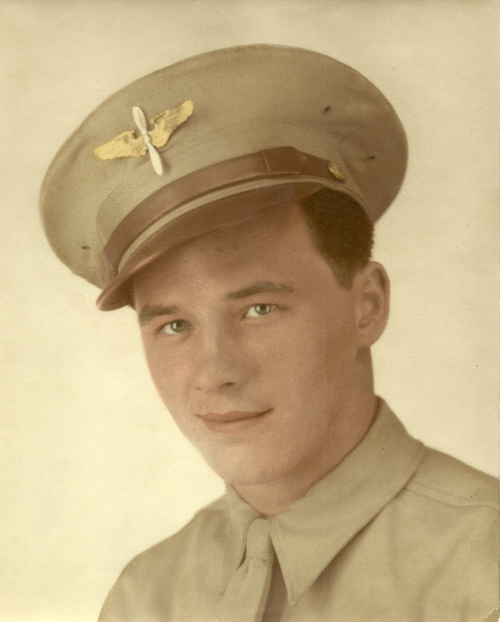|
GRANDPA'S UNIFORM
The Story of Jack and Martha Emhoff
And their experiences during
World War II
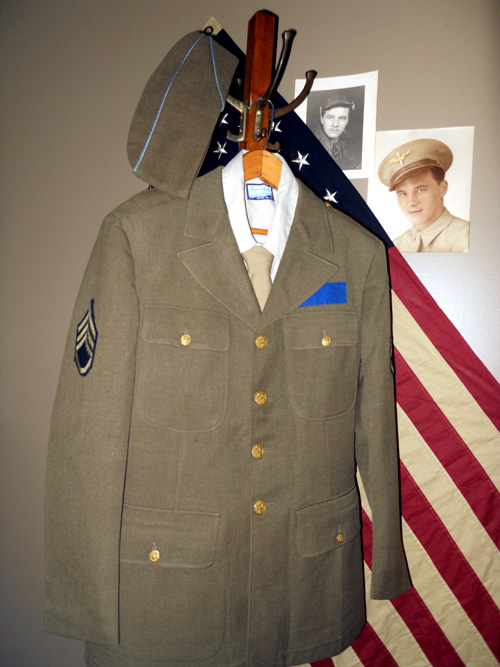
The uniform was an olive green color jacket, made of wool, with shiny
buttons, a wool hat and two different ties. The uniform had been packed
safely away after The War, along with the memories it stirred, too vivid
and real to keep out for everyday life.
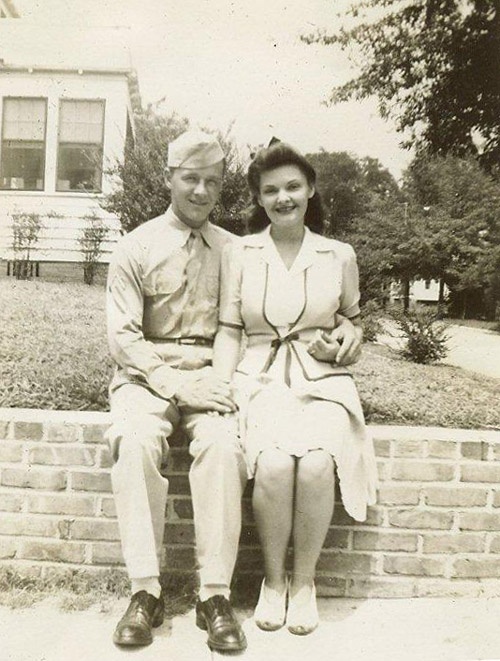
More than fifty years have passed and the world is starting to realize
that now is the time to bring out the uniforms and the memories they carry
while there are still those who remember. As part of this remembering our
son Kevan was given a History assignment to write a report and give an
oral presentation on some aspect of World War II. As we discussed the
different events and battles that he could report on it occurred to me
that no published information could possibly be as valuable as
interviewing someone who was there. Kevan decided to interview his
Grandpa, Jack Emhoff. Grandma and Grandpa got out the old uniform, came
out to our house one evening, and for two hours we sat around the dining
room table, with pen and paper, to record feelings and experiences we
never imagined.
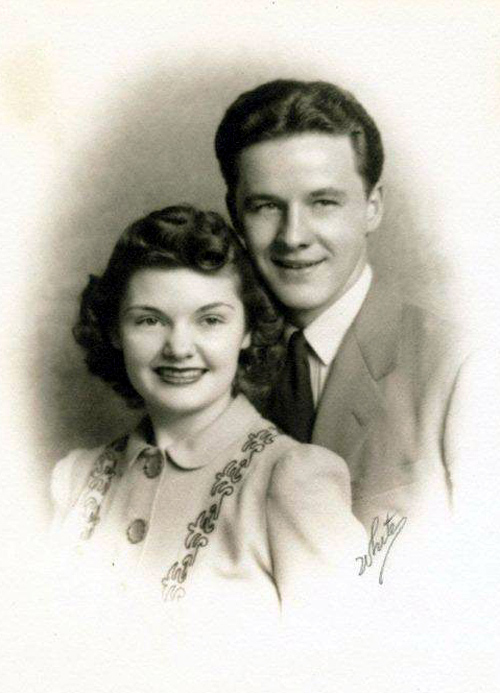
Grandpa was born Jack Crossman Emhoff on November 02, 1922. He married
Martha Elizabeth Benson on November 28, 1942. He was working at the
Punxsutawney Beef Co. in February 1943 when he was drafted into military
service. He chose the Army Air Force and was assigned to the 387th Bomb
Group, 557th Bomb Squadron.
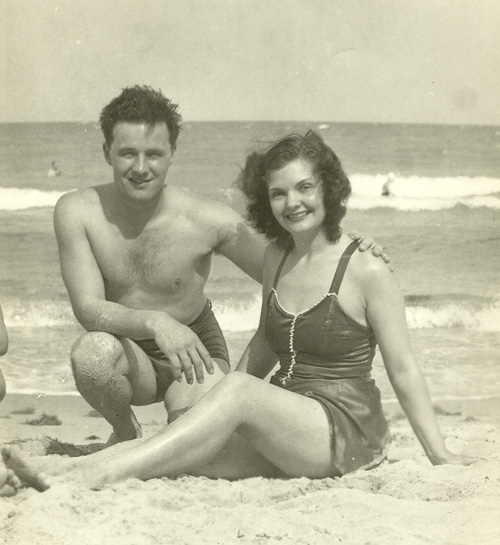
He was processed through Indiantown Gap, PA to Miami, FL for basic
training. From Florida he was transferred to Seymour Johnson Field in
Goldsboro, North
Carolina where he spent four months in airplane mechanic school. While he
was there Grandma was able to go down from May until mid-August. She said
she
took her big Bible storybook, her embroidery things, her clothes and
everything else she needed all in one suitcase. After completing mechanic
school he
was sent to Ft. Meyers, FL for one month of gunnery school. Schooling
completed, he was finally able to come home on leave for two weeks over
their first
wedding anniversary.
The time with Grandma passed quickly and it was once again time to leave,
this time not knowing when (or the unspeakable if) he would be back. He
went to
Lake Charles, Louisiana where he was stationed from December 1943 until
March 1944. While he was there he was assigned as Airplane Mechanic/Gunner
to the
following flight crew: Pilot: Warren S. Miller of Utah, Tail Gunner:
Angelo Bernardi, Fresno, California, Radio Operator: Joseph Sradeja of
Toledo,
Ohio, Bombardier: Lloyd Hensley of East St. Louis, Illinois, and Co-Pilot
Frank Holmes of Palm Desert, California - six men whose lives would be so
intimately linked that their next breath depended on the actions of each
other. The time at Lake Charles was spent learning to work together and
doing
practice flying over the Gulf. When this safe practice time was over they
were sent to Georgia to be processed. Grandpa said he received his
clothing and
his gear, but no official destination, although everyone knew they were
headed overseas. While he was in Georgia he got a telegram from Grandma
telling him
about the birth of their first son, who he would not get to see until he
was over one year old. On April 2, 1944 Grandma received a letter while
she was
still in the hospital, telling her that he was being shipped out, again
destination unknown. She said how hard it was getting that letter, with no
return
address, and knowing she had no address to write back to. The crew was
sent to Homestead, Florida where they were assigned a brand new plane, a
B-26 Martin
Marauder, that they would fly to England.
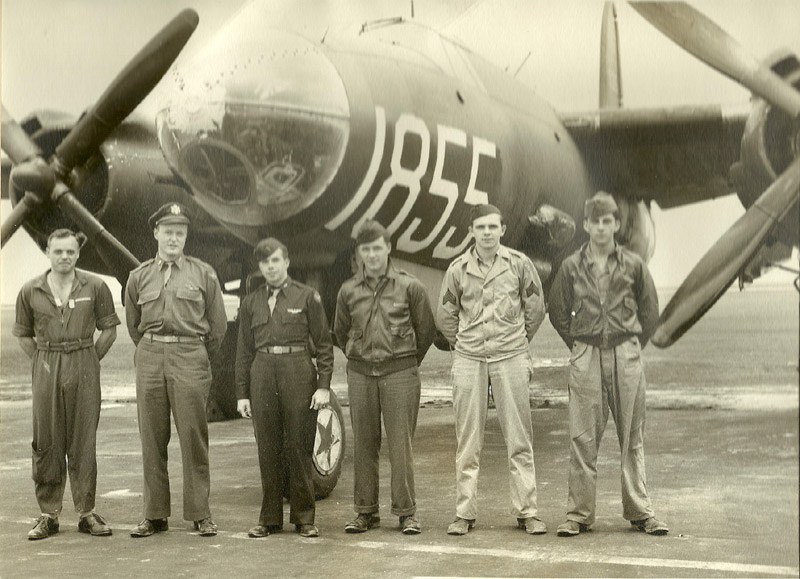
The Crew in front of a B-26 Bomber
Left to Right: Warren Miller, Pilot; Frank Holmes, Co-Pilot; Lloyd
Hensley, Bombardier;
Jack Emhoff, Mechanic/Turret Gunner; Joe Sradeja, Radio Operator and
Angelo Bernardi, Tail Gunner
The Trip Over
There were two routes used to get the troops to Europe, the northern route
by Greenland or the southern route by way of Africa. Grandpa's plane was
heading
south. The southern route had many stops and one-day layovers. They flew
first to Trinidad, then to British Guyana where they rested a day. They
left
there and flew over the Amazon to Natal, Brazil. While he was there
Grandpa got to do a little shopping. He brought a pair of silk stockings
for Grandma
and thought he paid about 35 cents for them. The next stop was to Belem,
Brazil and then on to the Ascension Islands. The plane had just enough
fuel to
make it there, if they got off course and missed the island, they would go
down. After leaving the Ascension Islands they flew to Roberts Field,
along what
was then called the Ivory Coast, in Dakar, Africa. They made it to
Marrakech, Africa where they had to wait for two weeks because of the
weather. They
were only able to do daytime flying and they had to have the right tail
wind to get them around Spain and Portugal as those two countries were
neutral and
they were not allowed to fly over them. Grandpa said how poor the country
seemed. There were beggars that would wait for them outside the mess hall
with a
can for you to scrape your scraps into. He also said they had some of the
people do their laundry for them, in a creek, and it came back a little
soapy.
Before they were ready to leave Africa their co-pilot became ill with
yellow jaundice so they were assigned a new co-pilot and had to leave
without their
regular one. When the winds finally cooperated they took off for Ireland.
This was a touch and go flight, again with just enough fuel; in fact, one
tank
was empty and Grandpa had to transfer the fuel from one tank to the other
to keep both engines running so they could make it to the airfield in
Dublin,
Ireland. From Ireland they continued on a train to the airbase at
Willingale, England. They were there for about two weeks before they
started their
actual missions. During this extra time they flew practice runs. There
were times when Grandpa flew in the position of co-pilot and the pilot
actually
left him fly the plane some. Practice was over and it was now time for the
first of 65 bombing runs to begin.
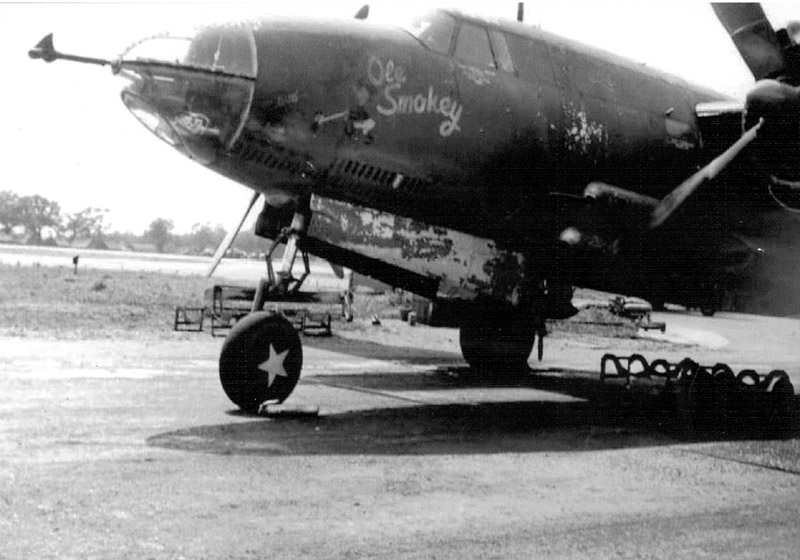
B-26B-20-MA "Ole Smokey", Serial No. 41-31720, Code "KS-Z",
387th Bomb Group,
557th Bomb Squadron
Bombing Runs
The first runs were out of England over France. Most of their missions
were flown in a plane called "Ole Smokey." Grandpa said early in the
morning they
would be given information about the weather and briefed and told what
type of target they were to hit. Only the pilot would be told the exact
location and
town where they were flying. Sometimes the bombing target would be the
launch site for buzz bombs, other times it was marshalling areas (railroad
yards),
fuel dumps, bridges, or troop movements. (Buzz bombs, sent up by the
Germans, were like a plane filled with fuel and timed to go down.)
Grandpa's crew
stayed based in England until after D-day and then was moved to Le Havre,
France - as the troops moved - they moved. When they were based in
Chateaudon,
France they flew missions to Frankfurt, Germany. Their missions were timed
for 2 1/2 to 3 hours so they never flew runs to Berlin because the flying
time
was too long.
There were many times when they came back from bombing runs with holes in
the plane from anti-aircraft fire. On one run over France a piece of flak
from an
artillery shell exploded through the window. The flak came directly over
Grandpa's shoulder, severed the hydraulic hose on his guns, and fell to
the floor
at his feet. He saved the two pieces of flak, a reminder of what could
have been. He remembered another time when "I knew, I don't know how I
knew, but I
did, that we had a flat tire. I told the pilot about it because we were
going to land. I put my head down and prayed." When they made their
landing
Grandpa had been right, the tire was flat from being hit by flak.
About another flight he said, "We were on our way back from a mission. We
were starting back across the English Channel when I saw 25-30 German
planes in
one big line coming behind us. Some of the other crews saw them also. We
fired a few shots and they turned and retreated."
On another mission, there was one plane that came back with no wheels.
They had to abort their mission and came back with one bomb still loaded.
Grandpa
watched as they landed and caught fire, causing the bomb to explode,
killing the crew, firefighters, and medics. He said there were terrible
things that
happened; but, "you had to push the bad thoughts out. Some guys talked
that they knew they wouldn't get back, but I always felt I'd get back."
These were terrible days for those back home too. Although they were able
to write letters, they had to guard what they said. Grandpa was not
allowed to
tell Grandma how many missions he had flown so in one corner of the letter
he would write a small number that would let her know. Grandma said that
when
anyone was killed or injured the family was notified by a telegram and a
taxi always delivered the telegram. One day Grandma was in the house with
Uncle
Bill and saw a taxi come up the street and start to slow down and stop.
She said she just cried "It's stopping! It's stopping!" As quietly as
it came, the taxi turned around and went back down the street looking for
another home to receive the grim message. (Although it has been more than
50
years since that experience, the fear and emotion felt then have not
dimmed. At the dining room table that night, we all sat with tears as
Grandma struggled
to tell us this story.)
The Battle of the Bulge
The day of the Battle of the Bulge was the day the Germans made their last
great push. Some German ground troops were even wearing American uniforms.
Grandpa had to fly that day and he said that an expression used to
describe the battle was that the Germans "threw everything up but the
kitchen sink." The
bombardier in Grandpa's crew was assigned to fly in the lead plane that
day and that plane was hit and one engine knocked out. The other planes
saw four
chutes out before the plane exploded killing the pilot and engineer
gunner. The bombardier said when he landed he heard a rifle bolt and was
scared to
death, luckily it was an American soldier. He got back to the airfield in
England the next day and was given a few days to recuperate before
rejoining his
regular crew.
When the planes went out they always flew with six planes per flight and
three flights per squadron for a total of 18 planes. Each plane flew with
the tail
gunner in the rear of the plane and the radio operator in the belly, and
the gunner (Grandpa) in the clear top turret of the plane where you could
rotate
360 degrees. This day Grandpa's plane was in the middle flight. He said
"When I looked back I thought our fighter escort was engaged with German
fighter
planes, but it was German fighter planes attacking our last bomber flight,
shooting all of them down. Then they started on the high flight, but must
have
run out of ammunition. One American was hit and killed before they left."
The Last Days
The last couple of missions that Grandpa flew were to take out the
submarine pens at Le Havre, France. The bombers were each carrying four
250 pound bombs.
Somehow one of the live bombs in Grandpa's plane got hung up in the bomb
bay. In order to be able to land safely Grandpa had to crawl down in the
open bay,
replace the pin in the propeller, and kick the bomb loose over the English
Channel.
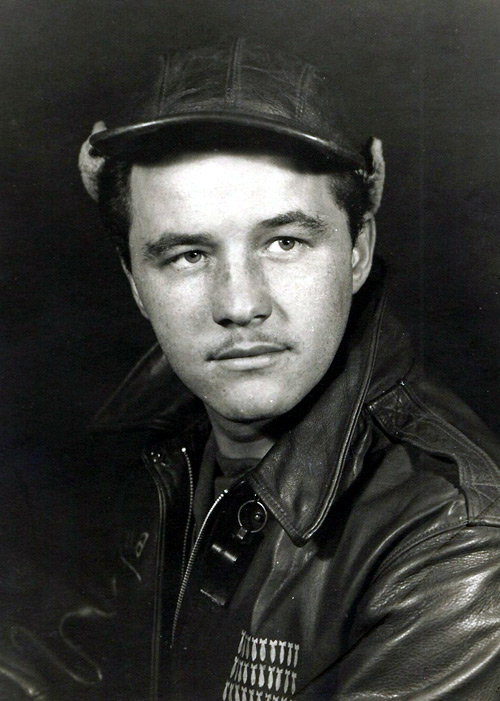
Finally 65 missions were safely completed and there would be no more for
this crew. They had about two weeks until they would be processed home.
During
this time Grandpa was able to ride up to the front lines and could see the
German pillboxes with German soldiers in them. He also got to talk to some
German prisoners and one of them gave him a German medal, which he still
has. He flew back to England in a C-47 cargo plane where he left South
Hampton by
ship to return to the States. He said it was an awfully rough trip that
lasted nine days, finally landing in Boston where he enjoyed a big steak
dinner.
He went from there to New Jersey and boarded a train to Altoona, PA.
Grandma said she had received a telegram telling her when he would be in
Altoona and
she could hardly wait to get there. Grandma, Uncle Bill, and Jackie, who
had celebrated his first birthday a few weeks earlier, left for Altoona.
Grandma
said "The exciting moment we were waiting for - seeing Jack get off the
train and spot us with Jackie - never happened. A few soldiers got off and
went to
their waiting families, but no Jack got off and the train pulled away to
its' next stop. Now what should we do? Bill had to go back to Punxsy
(Punxsutawney) for work the next morning. The rest of us spent the night
worrying and trying to locate Jack, even calling the Red Cross for help.
However,
Grandpa wasn't worried at all, he was sound asleep. He finally woke up and
got off the train in Pittsburgh where he caught a later train to Punxsy.
Jackie
and I were still in Altoona. Uncle Kenny and Aunt Ruthie, always helpful,
rented a car and took us to Punxsy for the awaited reunion and for Grandpa
to see
his son, Jackie, for the first time in April 1945. This reunion was at the
same train station where we had said good-bye in December 1943."
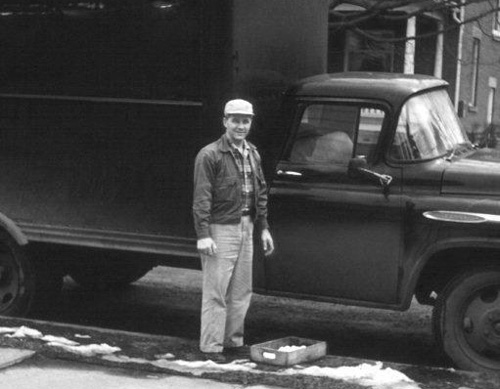
To finish his tour Grandpa was sent to Laredo, TX to participate in
instructors' school. He was just about ready to get to fly when he had
earned enough
points to be discharged. His discharge was final in July 1945 at Jefferson
Barracks, Missouri. For his service he was awarded the Good Conduct Medal,
Air
Medal, Camp Medals, and the Distinguished Flying Cross. He returned home
and within a week was back at work for Punxsy Beef, first in the cheese
department
and then as a salesman. He continued to work there until they closed in
1958 when he bought his own truck and started to sell poultry.
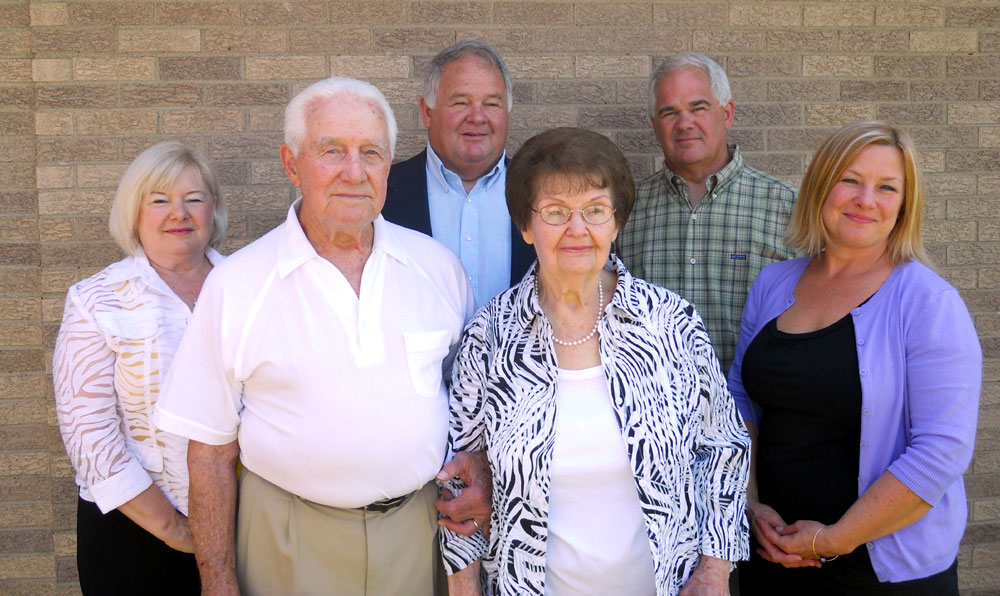
Grandma and Grandpa had four children: John Dennis (Jackie), Bruce Allen (Kevan's
father), Karen Ann and Marsha Lee.
Their children have given them 13
grandchildren and 15 great-grandchildren (so far). "Some of My Feelings"
(Written by Jack C. Emhoff, July 2001)
"When I went into the service I tried to put all feeling aside. I knew I
would get very lonesome to be back with my family. One of the worst
disappointments was when Jackie was born and I thought I was going to get
home to see him before I went overseas. My commanding officer thought he
might be
able to get me a leave and I would have been able to take a boat across
from New York to England. But because our home was so far from New York
City I
couldn't get the leave and come home. That was one of the worst cries I
had at night early in my tour. It is an awful lonely feeling you get when
you
think of everyone back home and know you can't be with them. Nighttime is
the worst.
Some of the scariest times were on the bomb run just as we were going into
the target to drop our bombs. We had to fly straight and level for about
three
minutes, which seemed like forever. They could really sight their
anti-aircraft guns on us at this stage. I would always put my head between
my two 50
caliber guns and pray that we would make it. Thanks to Jesus we always
did."
Eternally Grateful
When we finished the interview we were all emotionally drained. There was
so much to tell that I wondered how Kevan could ever get his class to
truly
understand what his Grandpa and Grandma had gone through. Nevertheless, we
prepared the outline and got the uniform ready for Kevan to wear. He
introduced
his topic, put on the uniform, and told the story in first person as Staff
Sergeant Jack C. Emhoff.
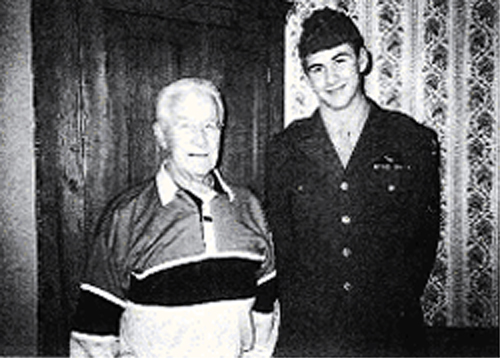
Kevan's project is finished and Grandpa's uniform is once again stored
away, with many memories shared, and perhaps some still silent and kept.
However; I
decided to write this story so that each one of us, children,
grandchildren, great-grandchildren, and those to come will know of the
sacrifice made by their
Mom and Dad or Grandpa and Grandpa, Jack and Martha Emhoff.
Grandpa also said, "There were many unpleasant happenings, some to forget
about. Always you were glad you were still able to lay your head down on
your
pillow and think about back home and do a little crying and praying." For
all of the family I can say, "We are eternally grateful that those prayers
were
answered.
Jack and Martha Emhoff with most of their family, Memorial Day weekend
2010
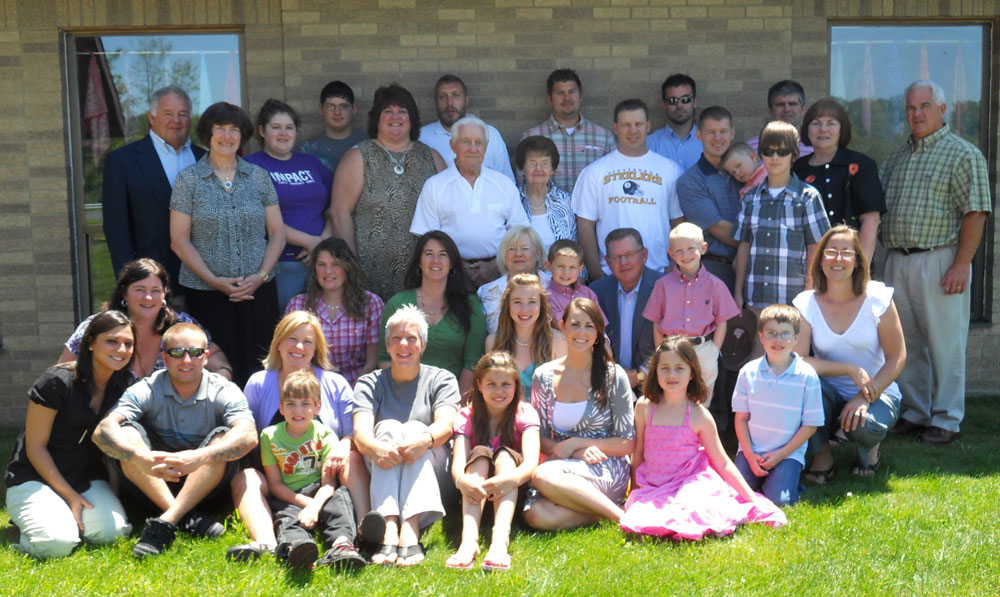
|
